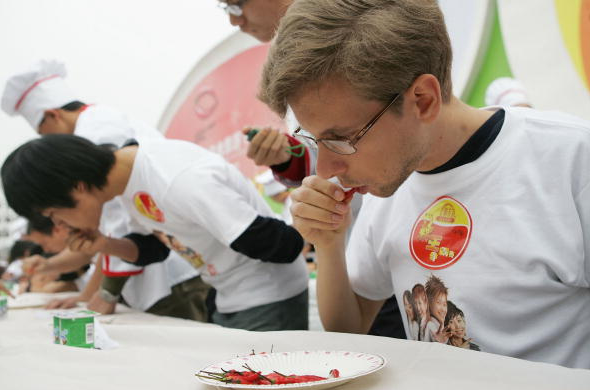By Angel Soleil, | September 19, 2016

A man eating a chili pepper. A new study has concluded that the preference among some people for chili pepper and other foods abhorred by others is the result of an acquired taste.
Research suggests that people can learn how to love spicy food. Paul Rozin, a cultural psychologist from the University of Pennsylvania, explains how.
Rozin, in his study, shed light on why some people like the taste of hot chili powder, while others cannot seem to stand the burning sensation in their mouth. He also revealed that people could learn how to like - or at least tolerate - the taste of spicy.
Like Us on Facebook
During the 1980s, Rozin traveled to Mexico because he wanted to know why chili pepper suddenly became a staple ingredient in Mexico and parts of Southeast Asia, when it was initially abhorred in Europe. He wondered how something that tastes so bad could suddenly turn into someone's favorite. During his studies, Rozin discovered that in a village of 1,500 people, everyone loved hot chili, because they have been exposed to it a lot.
But his study on chili peppers led to an even deeper discovery. Rozin analyzed the experience and described it as a sort of "hedonic reversal." He explained that "the reason you're exposed to it a lot is because that's what the family's serving, so you just eat it. The experience of eating it a lot somehow converts what was an aversion to a preference."
There is not a change happening in the tongue, or the human senses or even structure in the brain - it is only a matter of preference. Rozin theorized then that a liking to certain types of food could be traced to how people have been socially pressured or taught to like or dislike a certain taste.
He concluded that humans have a special ability to overcome an innate aversion and turn it into something pleasurable. In laymen's term, people can learn to love the things they hate, either because they have been continually exposed it them or of pressure from an external force. He described this as "benign masochism" - because as long as it does not hurt, the body can adapt.
-
Use of Coronavirus Pandemic Drones Raises Privacy Concerns: Drones Spread Fear, Local Officials Say

-
Coronavirus Hampers The Delivery Of Lockheed Martin F-35 Stealth Fighters For 2020

-
Instagram Speeds Up Plans to Add Account Memorialization Feature Due to COVID-19 Deaths

-
NASA: Perseverance Plans to Bring 'Mars Rock' to Earth in 2031

-
600 Dead And 3,000 In The Hospital as Iranians Believed Drinking High-Concentrations of Alcohol Can Cure The Coronavirus

-
600 Dead And 3,000 In The Hospital as Iranians Believed Drinking High-Concentrations of Alcohol Can Cure The Coronavirus

-
COVID-19: Doctors, Nurses Use Virtual Reality to Learn New Skills in Treating Coronavirus Patients







